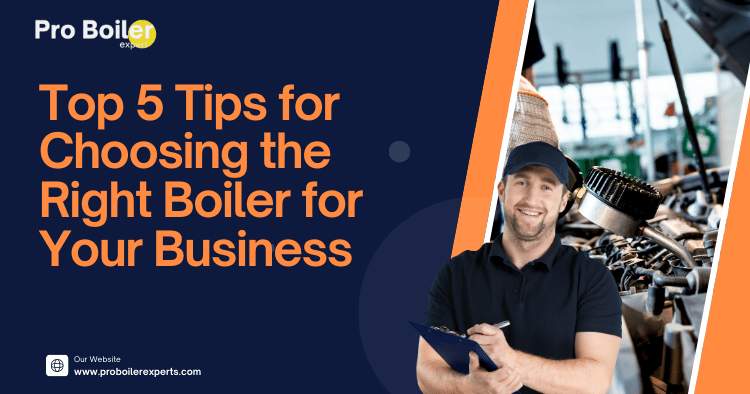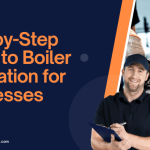Table of Contents
- Understand Your Business Needs
- Consider the Type of Boiler
- Evaluate Efficiency Ratings
- Think About the Installation and Maintenance
- Budget for Your Boiler Purchase
Choosing the right boiler for your business is a critical decision that can impact your operational efficiency, energy costs, and overall comfort. With various options available, it can feel overwhelming. That’s why we’ve compiled these top five tips to help you make an informed choice!
1. Understand Your Business Needs
Before diving into the specifics of boiler types and efficiency ratings, it’s essential to assess your business’s unique heating requirements. Consider the following:
- Size of Your Facility: Larger spaces will require a more powerful boiler to maintain optimal temperatures. A small café may only need a compact boiler, while a manufacturing facility might require a high-capacity system.
- Hot Water Demand: Determine whether your business needs hot water for heating, food preparation, or other processes. For example, a restaurant will have different hot water needs than an office.
- Usage Patterns: Analyze your usage patterns to anticipate peak demand times. This will help you choose a boiler that can handle your business’s specific requirements without overworking.
FAQs:
- How do I calculate my heating needs?
You can use a heating calculator or consult with a heating professional to assess your needs based on space size, insulation, and usage.
2. Consider the Type of Boiler
There are several types of boilers available, each with its advantages and disadvantages. Here are the most common options:
| Boiler Type | Description | Pros | Cons |
|---|---|---|---|
| Combi Boiler | Combines heating and hot water in one unit. | Space-saving, energy-efficient | Limited hot water supply |
| System Boiler | Stores hot water in a cylinder for later use. | Good for high demand | Requires space for storage |
| Regular Boiler | Traditional system with separate water tanks. | Suitable for larger homes | Requires more installation space |
| Condensing Boiler | Extracts heat from flue gases to improve efficiency | Highly efficient, lower bills | More expensive upfront costs |
Choosing the right type of boiler is crucial for maximizing your investment. For a detailed comparison of boiler types, check out our article on Combination vs. System Boilers: Pros, Cons, Key Differences.
FAQs:
- What type of boiler is best for a small business? A combi boiler is often ideal for small businesses due to its compact size and efficiency.
3. Evaluate Efficiency Ratings
Boiler efficiency is key to reducing your energy costs and environmental footprint. Look for:
- Annual Fuel Utilization Efficiency (AFUE): This rating indicates how efficiently a boiler converts fuel into heat. A higher AFUE percentage means greater efficiency.
- Energy Star Certification: Boilers with this certification meet strict efficiency guidelines set by the U.S. Environmental Protection Agency (EPA).
Here’s a quick breakdown of efficiency ratings:
| AFUE Rating | Efficiency Level |
|---|---|
| 90% – 95% | High Efficiency |
| 80% – 89% | Moderate Efficiency |
| Below 80% | Low Efficiency |
Investing in a high-efficiency boiler may have a higher upfront cost but can lead to significant savings over time. For more insights, refer to our guide on the Top 5 Energy Efficient Boiler Types for 2024.
FAQs:
- What is the average lifespan of a boiler? Most boilers last between 15 to 30 years, depending on maintenance and usage.
4. Think About the Installation and Maintenance
Proper installation and maintenance are crucial for optimal performance. Consider these factors:
- Professional Installation: Always hire a licensed technician for installation to ensure safety and compliance with local regulations. Check our resource on Essential Permits for Boiler Installation Process to understand the legalities involved.
- Maintenance Requirements: Regular maintenance can prolong your boiler’s life. Look for models that are easier to service, and consider setting up a maintenance contract with a reputable provider.
Visual Tip: Consider creating a maintenance checklist for your boiler to ensure it remains in top condition.
FAQs:
- How often should I service my boiler?
It’s recommended to service your boiler at least once a year. For maintenance tips, check out Essential Boiler Maintenance Tips: Keep Your System Efficient.
5. Budget for Your Boiler Purchase
Last but not least, budget considerations play a significant role in your decision-making process. Here are some tips:
- Initial Costs vs. Long-Term Savings: While a high-efficiency boiler might cost more upfront, it can save you money in the long run through reduced energy bills.
- Incentives and Rebates: Check for available government incentives or rebates for energy-efficient systems. Resources like the Energy.gov website can provide valuable information on available programs. Additionally, explore our article on Top Government Grants for Boiler Installation 2024.
- Financing Options: Explore financing options if upfront costs are a concern. Many suppliers offer financing plans to help businesses manage their budgets.
FAQs:
- Are there hidden costs I should consider?
Yes, consider installation, maintenance, and potential repair costs when budgeting for your boiler.
Choosing the right boiler for your business doesn’t have to be a daunting task. By understanding your needs, considering the type of boiler, evaluating efficiency ratings, and budgeting appropriately, you can make a well-informed decision that benefits your business in the long run. If you need more personalized advice, don’t hesitate to consult with industry professionals who can provide tailored recommendations. Happy heating!





